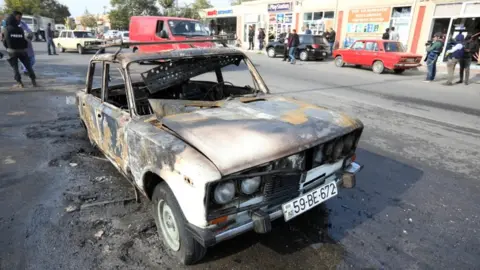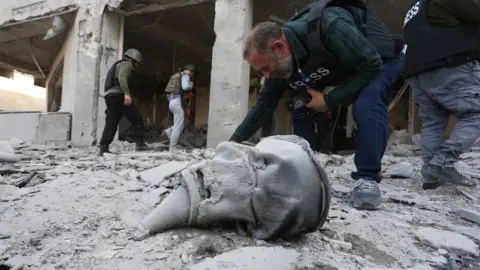Nagorno-Karabakh conflict: Missile strike on Azeri town kills 21 civilians
 Reuters
ReutersAzerbaijan has accused the Armenian military of killing at least 21 civilians in a missile strike as fighting over the disputed territory of Nagorno-Karabakh intensifies.
Dozens more were reportedly wounded in the strike on the Azeri town of Barda, not far from the ongoing clashes.
Armenia has denied carrying out the attack, and accused Azerbaijan of targeting a maternity ward in the area.
Fighting over the region of Nagorno-Karabakh erupted on 27 September.
The mountainous territory is officially part of Azerbaijan, but run by ethnic Armenians.
What happened in the latest strikes?
Azerbaijani presidential spokesman Hikmet Hajiyev said Armenian forces had "used cluster munitions to inflict excessive casualties among civilians" in Barda, in central Azerbaijan.
Images posted on social media showed damage to streets and vehicles with what appeared to be several bodies in body bags laid out on the road.
One local resident, Ulviyya Babayeva, said she was in her car nearby when she heard three explosions and decided to head to the area.
"We saw a fire... bombs have been dropped," she told the BBC. "One fell on the car outside a bank building, fragments [of bombs] everywhere, [broken] glass [of cars/windows]... one of the bombs fell outside fire rescue station, there are dead and injured people."


Police officers and other service personnel were sent to Barda to help transport the injured to hospital, as well as provide additional security in the town, the Azerbaijani interior ministry said.
The ministry added that the attack was a gross violation of international humanitarian law, and that the Armenian government should accept responsibility.
Separately, a statement issued by Karabkah officials said Azerbaijani forces had struck a maternity hospital and other "civil infrastructure" in the territory's city of Stepanakert.
 VAHRAM BAGHDASARYAN /PHOTOLURE
VAHRAM BAGHDASARYAN /PHOTOLUREThey added that information on possible casualties at the facility, which had been under construction, was "being clarified".
The latest attacks come just days after a US-brokered ceasefire was agreed between the two sides.
Earlier, Azerbaijani media reported that the head of the Nagorno-Karabakh military, Jalal Harutyunyan, was killed in a special operation on Tuesday.
The Azerbaijani defence ministry said that Mr Harutyunyan, who it accused of carrying out war crimes in the region, was identified by surveillance teams entering a vehicle, which was then targeted by a drone strike.
What about the ceasefire?
The US-brokered ceasefire, the third relating to the recent conflict after two previous agreements brokered by Russia failed, began early on Monday.
US President Donald Trump tweeted shortly after it was announced by the US state department at the weekend to congratulate those involved following "intense negotiations".
But just minutes after it came into force, Armenia and Azerbaijan both accused each other of violating the truce.
Azerbaijan said Armenian forces began shelling the town of Terter and nearby villages in a "gross violation" of the agreement.
Armenia's defence ministry said Azerbaijani artillery had fired on military positions in various parts of the front line after the ceasefire agreement had begun.
Clashes that began in the region in September have quickly escalated into a large-scale conflict, with the shelling of towns and cities and the alleged use of banned cluster munitions.
Several thousand people have died and shelling has killed civilians on both sides. Tens of thousands have fled their homes.

Nagorno-Karabakh - key facts
- A mountainous region of about 4,400 sq km (1,700 sq miles)
- Traditionally inhabited by Christian Armenians and Muslim Turks
- An autonomous region within the republic of Azerbaijan, when it was part of the Soviet Union
- Internationally recognised as part of Azerbaijan, but majority of population is ethnic Armenian
- An estimated one million people displaced by six years of war between Azerbaijan and neighbouring Armenia, begun in 1988 when both were Soviet republics, and about 30,000 killed
- Separatist forces captured some extra territory around the enclave in Azerbaijan in this war
- Stalemate has largely prevailed since a 1994 ceasefire, but a peace treaty has never been agreed
- Turkey openly supports Azerbaijan
- Russia has military bases in Armenia
